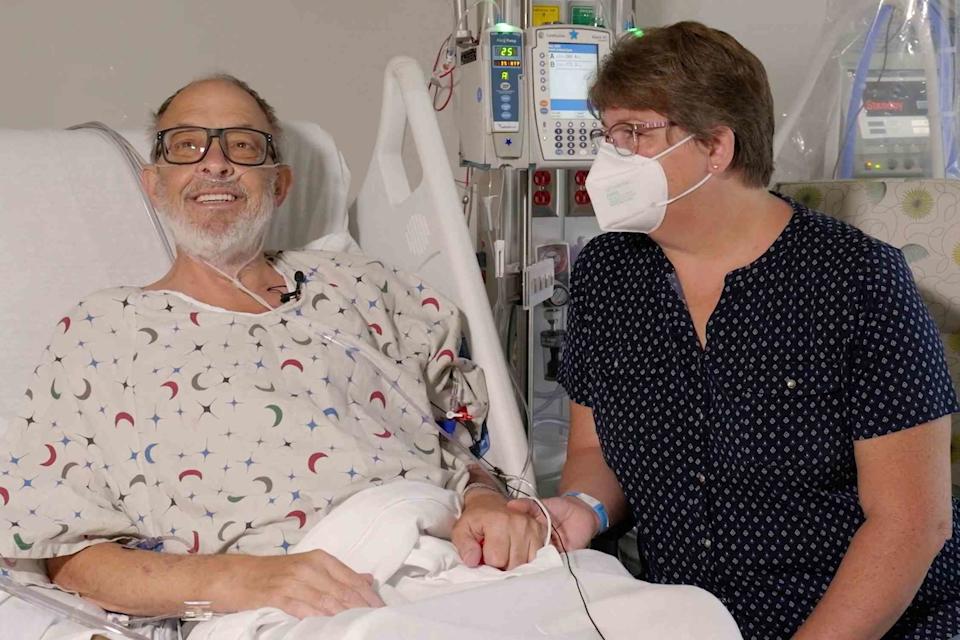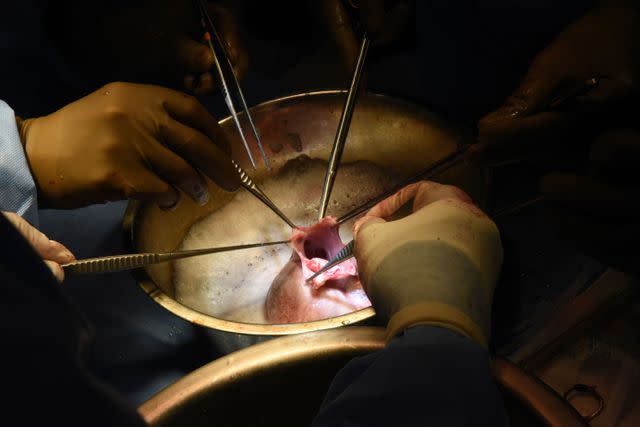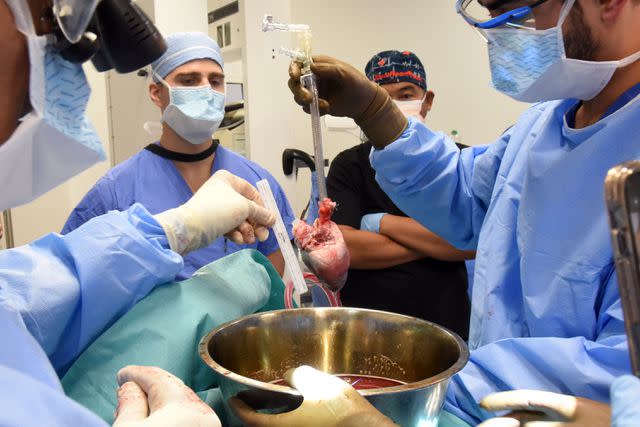Surgeons Perform Second-Ever Pig Heart Transplant to Save Dying Maryland Man: 'My Only Real Hope Left'
Surgeons at the University of Maryland Medical Center performed the groundbreaking procedure for the first time in January 2022

Deborah Kotz/University of Maryland School of Medicine via AP
Pig heart transplant recipient Lawrence Faucette and his wife, AnnFor the second time ever, a genetically-modified pig heart was transplanted into a living human recipient.
On Friday, the University of Maryland Medical Center announced in a release that the groundbreaking surgery took place on September 20 by the same transplant team who performed the first surgery in 2022.
The patient, Lawrence Faucette, reportedly had end-stage heart disease and was deemed ineligible for a traditional transplant with a human heart due to his pre-existing peripheral vascular disease and complications with internal bleeding.
The U.S. Food and Drug Administration granted emergency authorization for the surgery under its compassionate use provision on September 15.
“We are once again offering a dying patient a shot at a longer life, and we are incredibly grateful to Mr. Faucette for his bravery and willingness to help advance our knowledge of this field,” Dr. Bartley Griffith — professor of surgery at the University of Maryland School of Medicine who performed the operation — said in a statement.
“My only real hope left is to go with the pig heart, the xenotransplant,” Faucette told the hospital before his surgery. “Dr. Griffith, Dr. Mohiuddin, and their entire staff have been incredible, but nobody knows from this point forward. At least now I have hope, and I have a chance."

Deborah Kotz/University of Maryland School of Medicine via AP
Surgeons perform a pig heart transplant into Lawrence FaucetteRelated: First Person to Receive Pig Heart Transplant Dies After 2 Months
Following the surgery, the hospital said in a release that Faucette is now “recovering and communicating with his loved ones.”
The 58-year-old is also “currently breathing on his own, and his heart is functioning well without any assistance from supportive devices.”
In January 2022, the same surgical team at the University of Maryland Medical Center performed the first successful transplant of a genetically-modified pig heart on a local man.
At the time, the recipient David Bennett was diagnosed with a terminal heart disease and had been hospitalized and bedridden for several weeks after being "deemed ineligible" for a traditional heart transplant.
The U.S. Food and Drug Administration granted emergency authorization for the surgery under its compassionate use provision on New Year's Eve.
The transplant was initially deemed successful when Bennett's body did not immediately reject the new organ. However, the 57-year-old died in March 2022, two months after the procedure, due to a porcine virus.

Deborah Kotz/University of Maryland School of Medicine via AP
Surgeons prepare for a pig heart transplant into Lawrence FaucetteNever miss a story — sign up for PEOPLE's free daily newsletter to stay up-to-date on the best of what PEOPLE has to offer, from celebrity news to compelling human interest stories.
Griffith told The New York Times it's possible the virus played a factor in Bennett's death and "hitched a ride" into Bennett's body through the pig. However, Dr. Griffith said there's no indication the virus caused an infection nor that Bennett's body refused the organ.
Experts said the pig was evaluated multiple times for the virus, but tests can only detect active versions and not latent ones that can lie dormant without detection.
"This doesn't really scare us about the future of the field, unless for some reason this one incident is interpreted as a complete failure," Dr. Griffith said, per the publication. "It is just a learning point. Knowing it was there, we'll probably be able to avoid it in future."
According to statistics from the federal government, around 110,000 Americans are currently on the waitlist for an organ transplant, and more than 6,000 patients die each year before they are able to receive one.
Transplanting animal organs, also known as xenotransplantation, "could potentially save thousands of lives but does carry a unique set of risks," the University of Maryland said.
For more People news, make sure to sign up for our newsletter!
Read the original article on People.

 Yahoo News
Yahoo News 
